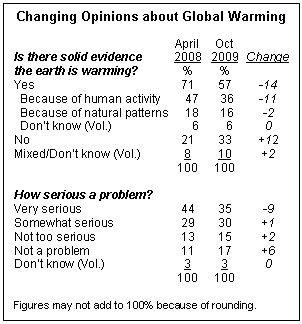The big news yesterday was a Pew poll showing a precipitous decline in the number of people who believe there is strong scientific evidence for anthropocentric climate change. Jon covered the details pretty well, including some reasons it should be taken with a grain of salt.
It’s peculiar that these polls are often taken as a judgment on the science itself, like Believers and Deniers are two teams duking it out and public acceptance is the score of who’s got better facts. That’s not how science works at all. As 18 leading U.S. scientific organizations reminded the Senate this week (PDF), we know that “climate change is occurring, and rigorous scientific research demonstrates that the greenhouse gases emitted by human activities are the primary driver.” We know this in the best way that we know how to know things, through multiple lines of evidence and multi-layer peer review involving scientists from dozens of countries. We know it with a far greater degree of confidence than we know the vast bulk of the economic, political, and folk psychological theories that guide our collective lives.
These are, as far as developed civilizations have been able to determine, the institutions and practices that produce the most trustworthy knowledge about the natural world. If we reject their conclusions — or pretend their conclusions can be upended by a blog post or public opinion poll — we abandon one of the few remaining arbiters of consensus reality. If peer-reviewed science has no special status, then every aspect of human or ecosystem health is partisan. Every policy-relevant matter of fact is decided by shouty blog comments and bad cable tv. Everything is contestable: postmodernism, courtesy of conservatism. (See: Chris Mooney.)
It should be noted, of course, that 57% ain’t bad, given the public’s generally low level of scientific knowledge. About 79% of people know the earth revolves around the sun rather than vice versa, while 80% believe prayer accelerates healing. Some 75% believe in angels but just 39% believe in evolution. Public opinion on matters of science is of great interest for a great many reasons, but it is a poor guide for public policy. Everyone deserves to have their voice heard on how we might best respond to what’s happening, but what’s happening is happening and we can’t change it by not acknowledging it. As Bill McKibben is fond of saying, nature doesn’t negotiate.
The temptation is to respond to a poll like Pew’s with lamentations about the state of science education — to imagine that the public, like scientists, can be swayed by the weight of empirical evidence. But the most important political takeaway is almost the opposite: popular belief in the science of climate change will follow popular support for clean energy, not the other way around. Make clean energy cheap, easily available, and desirable to the mainstream, and people will stop paying attention to industry-funded cranks and charlatans. There won’t be the same anxiety and loss aversion to exploit.
The poll also shows that 73% of people — 22% more than believe there’s good evidence for anthropocentric climate change — believe it’s a serious or somewhat serious problem. Some 50% support cap-and-trade, yet only 24% even know that cap-and-trade is an environmental policy.
In these incoherent results there is another important lesson: quiz Americans on their knowledge and you get confusion; solicit their goals and aspirations and they are clear. Poll after poll has shown that the public supports clean energy, supports Obama, and wants legislative action. Those are the polls that matter.





